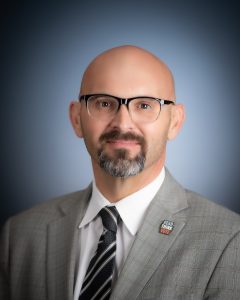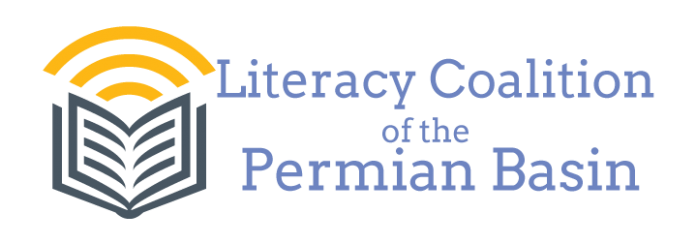There has been a dearth of data over the years on literacy in the Permian Basin, but the newly formed Literacy Coalition of the Permian Basin now has the information and is working toward a solution.
The coalition’s three founding funders were the FMH, Abell-Hanger and Brown Family foundations. They have since gotten the Permian Strategic Partnership on board as a founding funder.

Executive Director John Trischitti III, said this would give them a longer runway. Trischitti also is the vice president of the Midland ISD Board of Trustees.
“They know that this is something that you just don’t turn around quick, so that first year it was really important to get the study done, the needs assessment, because we knew that there was an issue. But the problem is that literacy, historically, is it has been underfunded and under-researched. Outside of the k-12 space, there’s really not a lot of great data for adult low literate or family literacy,” Trischitti said.
The Literacy Coalition commissioned the American Institute of Research (AIR) to do a Literacy Needs Assessment specifically for the Permian Basin region. The findings were shown at a literacy summit in Monahans.
A second Literacy Summit will be held Aug. 30 in Hobbs, New Mexico to specifically address Eddy, Chaves and Lea counties.
“There’s little pockets here and there, especially in a region like we have in the Permian Basin, where it’s very rural and very geographically isolated. So that first year was really about getting the needs assessment done working with the Barbara Bush Foundation and their national action plan for adult literacy and just kind of seeing what the hard data really is,” he said.
“Unfortunately, it was worse than we thought it was which strangely justifies the risk that the foundations took in creating this organization. But when you start talking about a third of adults in the Permian Basin read below a third grade level, and in some of these counties it’s as high as 50 percent, there’s plenty of work to be done … and so it’s just finding those organizations that are out there doing the work that people may not know about.”
There is a social stigma when it comes to adult literacy.
“… They’ve made it to adulthood and kind of figured out a way to navigate through life. Maybe their spouse doesn’t know. Maybe their employers don’t know, so it’s really just convincing them about solving the issue … It’s going to improve your opportunity to get a better paying job. It will help your kids. You’ll be able to read the notes that come home from school. You’ll be able to read your kids’ prescriptions from the doctor. It just affects so many things, so we want to be able to … tear down some of those social stigmas and social barriers that exist and hopefully engage them and encourage them and incentivize them in some way whether that’s the GED, or a certification of some kind, welding, or CDL truck driving; show them the greater value,” Trischitti said.
Third grade or below is considered low literate. Illiterate is when you can’t read anything.
“… Low literate, which is what we really feel is the glass ceiling, is third grade or below and about a third of adults in the Permian Basin are at that level,” Trischitti said.
A lot of those organizations are run by volunteers and may not have a paid staff or a website, so it can be difficult to engage with them, Trischitti said.
“But we want individuals to know they’re out there if they need that kind of assistance. And then the other side that we want to do is really fill in where there is no service at all which call literacy deserts where there is no service. How do we begin to build capacity to offer a service? Is it partnering with a civic group; is it partnering with a church group; a chamber of commerce so try to be able to especially in those geographically isolated areas to be able to offer some sort of service,” Trischitti said.
He added that a generation of students is being created that starts behind and stays behind. He said this means you have to prepare children for kindergarten and tackle adult literacy.
Trischitti said data shows that if you go into third grade below reading level, three out of four students won’t catch up before graduation.
“… We’ve got to make them kindergarten ready. The challenge is if they’re not kindergarten ready because they don’t have someone at home that probably has the literacy skills necessary to help them be kindergarten ready, so you have to hit them at both ends. You have to have that adult piece and you have to have that family literacy piece so how you tackle it is you make yourself available where they’re already getting whether that’s social services or government assistance because the correlation between poverty and low literacy and crime and low literacy are well connected,” Trischitti said. “… Very high percentages of those are the same individuals. So I want to collaborate with those organizations to begin to start to assist them, or at least provide and offer assistance, where there could be some. If that’s getting bilingual books, maybe they can read in their native language. Maybe you get a bilingual book and if they’re reading with that child together it’s benefiting them both. It’s also helping that student become equipped to begin school,” he added.
Trischitti said there’s no easy answer.
“A lot of people a lot smarter than me have tried to tackle this over the course of the decades, so we’re going to keep our head down and get as many partners as we can and really hope to be able to provide and offer services out there,” he said.
The Literacy Coalition of the Permian Basin (LCPB) was founded in 2021 to address the literacy challenges prevalent in the Permian Basin, which includes nineteen counties in Texas and three in New Mexico, with the mission to increase the literacy levels and skills of all people in the Permian Basin improving their quality of life, Trischitti said in a May 21 Guest View in the Odessa American.
The Literacy Coalition’s origins go back to before COVID.
Trischitti said Abell-Hanger and FMH got some people involved in different capacities such as education and libraries.
“I was a part of that original conversation when I was still library director (in Midland County) just trying to get what are the services; what are the issues; how can we begin to create a conversation around what that might look like. And then COVID happened and I think they continued to do some work during that time. Then in spring of last year, they had approached me and asked if I would be interested in coming on as the executive director of the coalition and beginning this work, something that certainly appealed to me given my background. It’s been a year now and (we’re) plodding along,” Trischitti said.
He noted that partnerships and collaboration are key to his organization.
“So while we may have some (unique) programs that the coalition administers like the Turn the Page program, a pilot program that’s going to be with the drug court in Midland County, where we can do literacy assessments and see what the needs are and give that data back to the judges so they can map out a plan for them. A lot of these are just about referring. If someone comes to us, we want to be a connector and a convener. If someone has a need, we’ll know Midland College, or Catholic Charities, Casa de Amigos, those are the organizations that for your need to get in touch with whether that’s ESL, GED, citizenship, CDL whatever the case may be,” Trischitti said.
Trischitti said he wasn’t the most motivated student in school, but the library saved him.
He grew up with a single mother, in a broken home, in Section 8 housing with food stamps with “plenty of excuses why I shouldn’t have succeeded.”
Trischitti said he didn’t see a path forward for his life. Things like college, retirement, cars and vacations were for other people; not him.
“So I spent a lot of time in detention, but detention happened to be in the library and so I had a librarian that said you can do more than that. … That just kind of changed how I thought about my future. I still barely graduated high school, but at least it put me on a path to college and I didn’t think at the time that I would make my living and spend most of my adult life in literacy and education initiatives, but just kind of the path that chose me I guess,” Trischitti said.
He grew up in Lubbock and graduated from Lubbock Coronado High School. He earned a bachelor’s in English literature from Wayland Baptist University and his master’s in library science from the University of North Texas in Denton.
Trischitti started as a children’s librarian in Dallas and said it was the best job he ever had.
“I loved storytelling and doing all that. But I needed to make more money to feed the family and feed the kids. (He has five children). My mother was still alive at the time and in ill health. The director’s job in Midland County for the Midland County Public Libraries opened in 2010 — late ‘09 or 2010 and I applied because I thought that I wanted to be a director, a public library director. That was one of those rare moves that was good professionally and personally. It bought me back to West Texas to raise the kids out here, be closer to my mother in her last years …,” Trischitti said.




